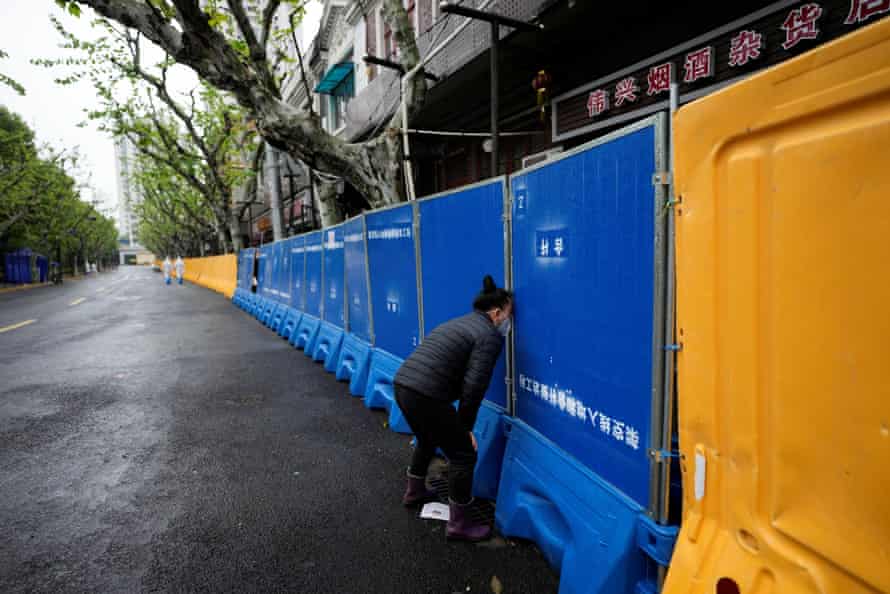When cases grew in Shanghai, I was hopeful. I thought there would be no way Shanghai would be like Jilin and Changshun, smaller cities that had recently locked down millions of people to contain Covid outbreaks. I assumed that the government would finally have to relax its kneejerk “zero Covid” approach.
I could not have been more wrong. Restrictions throughout China have become more draconian. We call this the Shanghai effect. After 24 million people became locked down here, everything was amped up elsewhere too. I live in a smaller city near Shanghai, and life has changed significantly in the last few months, our movements increasingly restricted. Some factories in Shanghai are beginning to reopen, but it seems that other restrictions will remain until cases fall further.
If there is one case in your district, thousands of people are locked down and millions tested repeatedly. Daily cases are rarely in double figures in the city where I live. But half the people I know are still in government quarantine without even having tested positive. You have to quarantine as a secondary contact, or if you previously visited what the government calls a “restricted area”. A family nearby have been locked down for two weeks after visiting a local park that subsequently became a restricted zone. They didn’t even see anyone in the park.
Stories such as theirs are common. All it takes is one person in your apartment building to test positive, and every resident, plus their close contacts, also have to quarantine.
This is the extent of the fear. And rules combined with fear discourage people from living a normal life. Every time you go outside, you think: will this be it? Is this the trip to the wrong supermarket that lands us all in quarantine?

Things could be worse, though. Most university students have been held on campuses since last October. Some have attempted to scale the walls; some have taken to social media threatening to hurt themselves and others. It’s creating a mental health timebomb.
Government data shows that our city is low risk. But this categorisation means nothing. As in Shanghai, most residents are unable to leave their building, compound or area code. Queueing up for daily Covid tests has become mandatory in most areas. A test taken within 48 hours is required to enter supermarkets. Rules change suddenly, and new complexities are frequently added.
Technology requirements have also accelerated. I was recently refused entry to a supermarket because I didn’t have the right access codes on my mobile phone app. I went home empty handed and later found out the app had crashed. This is happening regularly, and it leaves people stranded or unable to purchase necessities.
These complex rules and tracking apps not only discourage people from going out but also ensure everyone is fully tracked. However, this feels unnecessary after a law with the death penalty was threatened last year to those who do not adhere to restrictions.
For parents, however, the fear of separation is the killer. Schools here closed not because Covid cases appeared, but because authorities feared they might. Recently a child arrived at school with a red code, meaning they had crossed a restricted zone, and was taken away in a government vehicle. Everyone was told to remain calm: the child had not breached the school gates. Far from reducing panic, all everyone could think was: what if my child is next? The school closed shortly after.
The graphic video of a health worker killing a corgi in Shanghai – apparently for fear it could spread the virus from its infected owner – made international headlines. But similar situations have happened across China over the past few months. Everyone has a group of neighbours primed to grab their pets if quarantine calls. Although I still walk my dog, we bought packed grass for an indoor dog toilet if we get fully locked down. Fitting the grass and wiping dog excrement on it was one of those surreal Covid moments, one that we thought was resigned to the dark days of 2020.
Those of us now in disbelief at the harshness and scale of the government response are suffering from collective cognitive dissonance. Policies here have always prioritised fighting the virus over individual needs. Although China won the initial fight in Wuhan, the public made significant sacrifices. However, at that time the government response matched public fear and the perceived threat.
The virus was more deadly in 2020 and we knew little about it. Much has changed in the subsequent two years. We have a vaccine and are better at treating the virus. Omicron is less deadly than the initial variant. Yet the government’s response is still the same.
Fighting the virus has metamorphosed from being driven by the preservation of life to the preservation of image. China’s greatest strength during the pandemic, its ability to fight the virus, has become its downfall. Those who love China wait to see how long it will take the government to realise what everyone else can see. We just hope they realise it before too much more is lost.


